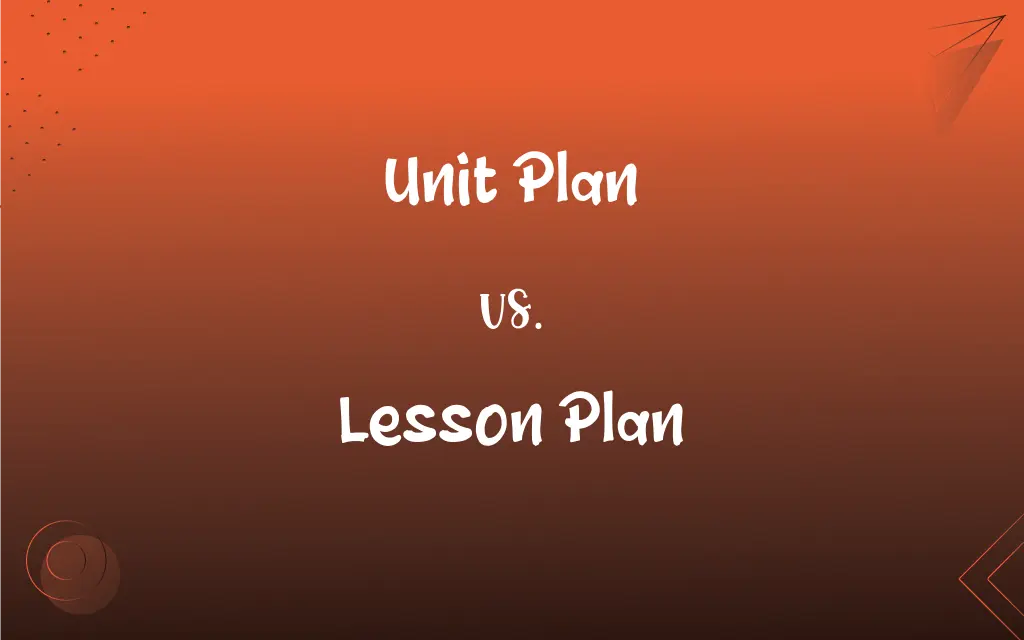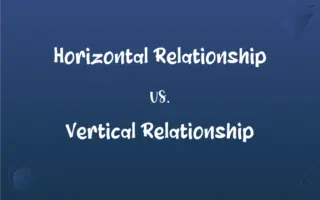Unit Plan vs. Lesson Plan: What's the Difference?
Edited by Aimie Carlson || By Janet White || Published on March 29, 2024
A unit plan outlines the overarching goals and materials for a specific unit of study, while a lesson plan details the activities and objectives for a single lesson.

Key Differences
A unit plan is a comprehensive framework that outlines the objectives, materials, activities, and assessments for a specific unit of study within a course. It provides a broad overview of what students should learn and achieve by the end of the unit. A lesson plan, on the other hand, is more detailed and focuses on the objectives and activities of a single lesson. While a unit plan covers the entire unit, a lesson plan breaks down the unit into manageable daily segments.
Unit plans and lesson plans serve different but complementary purposes in educational planning. A unit plan offers a macro view of a course, detailing key concepts, skills, and knowledge students should acquire. It sets the stage for the detailed work to be done in individual lessons. A lesson plan, conversely, provides a micro view, focusing on specific objectives for a single class period. It includes detailed instructions for activities, discussions, and assessments that will occur in that lesson.
When developing a unit plan, educators think about the broader educational goals, themes, and content that will be covered over several weeks or even months. This plan includes a sequence of lessons that collectively aim to meet the unit's objectives. In contrast, when crafting a lesson plan, teachers focus on the day-to-day execution of these themes and goals, including specific student activities, teaching methods, and resources needed for that day.
The relationship between a unit plan and a lesson plan is hierarchical. The unit plan sets the overall goals and structure for a particular segment of the curriculum, while individual lesson plans are the building blocks that detail how each piece of the unit will be taught. For example, a unit plan might cover a theme like "Ecosystems" over several weeks, with lesson plans for topics like "Food Chains," "Water Cycle," and "Human Impact on Ecosystems."
A unit plan provides a roadmap for an entire unit of study, outlining the journey through a topic or subject area, a lesson plan details the individual steps taken each day to navigate that roadmap. Both are essential for effective teaching and learning, ensuring that daily lessons align with broader educational objectives and that students achieve desired learning outcomes.
ADVERTISEMENT
Comparison Chart
Scope
Broad, covering an entire unit of study
Specific, detailing a single lesson
Duration
Can span several weeks or months
Covers a single class period
Objective
Sets overall goals for the unit
Focuses on daily learning objectives
Details
Outlines key concepts, skills, and assessments
Includes activities, materials, and specific instructions
Purpose
Provides a roadmap for the unit
Guides daily teaching and learning activities
ADVERTISEMENT
Unit Plan and Lesson Plan Definitions
Unit Plan
A comprehensive outline for a series of lessons in a particular subject or course.
The unit plan for the geography course includes a section on climate change impacts.
Lesson Plan
A detailed guide for a teacher outlining objectives and activities for a single lesson.
The lesson plan for today involves a hands-on experiment on electrical circuits.
Unit Plan
A framework that details the objectives, materials, and assessment strategies for a unit.
The science teacher's unit plan on ecosystems outlines projects and experiments for the semester.
Lesson Plan
A document that specifies the learning goals, materials, and assessment methods for a lesson.
Her lesson plan on photosynthesis includes a PowerPoint presentation and a lab activity.
Unit Plan
A strategic guide for educators to map out the progression of a unit.
The unit plan includes a variety of reading assignments to enhance comprehension skills.
Lesson Plan
An instructional tool that describes the structure and content of a class period.
The lesson plan for Monday's English class focuses on analyzing character development in a novel.
Unit Plan
An educational planning tool that organizes teaching themes and goals for a unit.
The unit plan for American History covers the Civil Rights Movement through lectures and documentaries.
Lesson Plan
A blueprint for conducting an effective and organized lesson.
Tomorrow's lesson plan involves a field trip to the science museum to explore biodiversity.
Unit Plan
A document outlining the sequence and scope of lessons within a unit.
The math unit plan on algebra introduces concepts progressively over six weeks.
Lesson Plan
A plan that outlines the teaching strategies and student activities for achieving lesson objectives.
The lesson plan on fractions includes interactive games to enhance understanding.
FAQs
What makes a good lesson plan?
A good lesson plan is detailed, flexible, and aligned with learning objectives, including clear instructions for activities and assessments.
What is a unit plan?
A unit plan is a comprehensive outline for a series of lessons within a specific unit of study, detailing the objectives, materials, and assessments.
Why are unit plans important?
Unit plans are important for ensuring that a series of lessons are cohesive and aligned with overarching educational goals.
How do unit plans and lesson plans relate?
Unit plans provide the broad goals and framework for a unit of study, while lesson plans detail the execution of these goals on a daily basis.
Can a unit plan change once implemented?
Yes, unit plans can be adjusted based on student progress, feedback, and the effectiveness of the lesson plans.
How do lesson plans support differentiated instruction?
Lesson plans support differentiated instruction by including varied activities and materials to meet diverse learning needs.
How detailed should a lesson plan be?
A lesson plan should be detailed enough to provide clear guidance on objectives, activities, materials, and assessment methods for the lesson.
How can a teacher integrate technology into lesson plans?
Teachers can integrate technology by using digital resources, interactive activities, and online assessments in their lesson plans.
What is a lesson plan?
A lesson plan is a detailed guide for conducting a single lesson, specifying objectives, activities, and assessment methods.
What are the components of a lesson plan?
Components include learning objectives, materials needed, detailed activities, and assessment methods.
Are unit plans shared with students?
Unit plans are generally used by teachers for planning, but overviews or summaries may be shared with students to outline expectations.
How do unit plans help in managing classroom time effectively?
Unit plans help in allocating appropriate time for covering each topic or skill, ensuring a paced and structured approach to teaching.
What role do assessments play in unit plans and lesson plans?
Assessments in both unit plans and lesson plans measure student understanding and achievement of the learning objectives.
What is the role of feedback in lesson planning?
Feedback helps refine lesson plans by indicating what works well and what needs adjustment for future lessons.
Can lesson plans be reused?
Yes, lesson plans can be reused or adapted for different classes, but may need adjustments to meet the specific needs of new students.
How often should unit plans be reviewed?
Unit plans should be reviewed annually or as needed to ensure they remain relevant and effective.
How can unit plans facilitate interdisciplinary learning?
Unit plans can incorporate themes and content from multiple subjects to create interdisciplinary learning experiences.
What challenges might a teacher face when creating a unit plan?
Challenges include aligning the unit with curriculum standards, ensuring content relevance, and balancing breadth with depth.
How can lesson plans encourage student engagement?
By including interactive and hands-on activities that cater to various learning styles, lesson plans can enhance student engagement.
What are some strategies for assessing student learning in lesson plans?
Strategies include formative assessments, quizzes, projects, presentations, and reflective activities.
About Author
Written by
Janet WhiteJanet White has been an esteemed writer and blogger for Difference Wiki. Holding a Master's degree in Science and Medical Journalism from the prestigious Boston University, she has consistently demonstrated her expertise and passion for her field. When she's not immersed in her work, Janet relishes her time exercising, delving into a good book, and cherishing moments with friends and family.
Edited by
Aimie CarlsonAimie Carlson, holding a master's degree in English literature, is a fervent English language enthusiast. She lends her writing talents to Difference Wiki, a prominent website that specializes in comparisons, offering readers insightful analyses that both captivate and inform.
































































